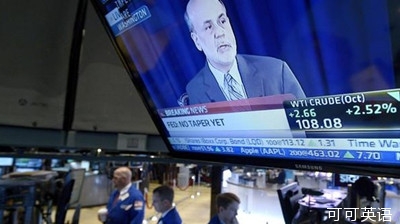在美聯(lián)儲(chǔ)5月暗示可能會(huì)退出貨幣刺激政策后不久,富裕國(guó)家的債券收益率飆升,新興市場(chǎng)貨幣和股市出現(xiàn)震蕩。
9月18日,在一個(gè)被密切關(guān)注的會(huì)議結(jié)束時(shí),美聯(lián)儲(chǔ)的政策制定機(jī)構(gòu)聯(lián)邦公開(kāi)市場(chǎng)委員會(huì)沒(méi)有選擇退出。
Instead, it said it would keep buying 85 billion a month of Treasury and mortgage bonds with newly created money.
去年9月開(kāi)始的新一輪購(gòu)買債券時(shí)表示,當(dāng)勞動(dòng)力市場(chǎng)的前景已經(jīng)大幅改善時(shí)QE會(huì)停下來(lái)。
In June Ben Bernanke, the Fed chairman, said the Fed would probably start to taper by year-end, and stop QE when unemployment hit 7%, which it expected by mid-2014.
在6月,美聯(lián)儲(chǔ)主席本?伯南克表示,美聯(lián)儲(chǔ)可能會(huì)開(kāi)始在今年年底如果失業(yè)率達(dá)到7%就停止量化寬松政策,預(yù)計(jì)是在2014年中期。
那么是什么原因?qū)е碌雇耍?/div>
First, the pace of job growth has recently flagged; the drop in unemployment has been flattered by the number of people no longer looking for work.
首先,就業(yè)增長(zhǎng)速度最近開(kāi)始減弱,失業(yè)人數(shù)的下降是被不再找工作的人數(shù)粉飾過(guò)的。
The labour-market participation rate sank to 63.2% in August, a 35-year low.
勞動(dòng)力市場(chǎng)參與率8月下跌至63.2%,是35年來(lái)的新低。
Second, fiscal policy continues to work at cross-purposes to monetary policy.
其次,財(cái)政政策將繼續(xù)為多個(gè)貨幣政策目的起作用。
Higher taxes and spending cuts have subtracted at least a full percentage point from growth this year.
更高的稅收和削減開(kāi)支至少降低了今年經(jīng)濟(jì)增長(zhǎng)整整一個(gè)百分點(diǎn)。
The prospect that spending caps may be lifted when the new fiscal year begins on October 1st has melted away.
在10月1日新的財(cái)政年度開(kāi)始時(shí)可能會(huì)取消支出上限的預(yù)期已經(jīng)沒(méi)有了。
With Republicans in Congress and Barack Obama unable to agree on how to fund the government or raise the Treasury's statutory debt ceiling, the risk of a government shutdown loomed large in the minds of Fed officials.
隨著共和黨在國(guó)會(huì)和奧巴馬政府在如何資助或提高財(cái)政部的法定債務(wù)上限上談不攏,在美聯(lián)儲(chǔ)的官員看來(lái)政府有很大的關(guān)閉風(fēng)險(xiǎn)。
But the third and most important restraint on the Fed was the unexpected effect on financial markets of a prospective change in monetary stance.
但是,對(duì)美聯(lián)儲(chǔ)的第三個(gè)也是最重要的約束是變動(dòng)的貨幣政策對(duì)金融市場(chǎng)的意想不到的影響。
The central bank had always emphasised that tapering did not mean tightening.
央行此前一直強(qiáng)調(diào)退出并不意味著緊縮。
Provided asset purchases remained above zero, the Fed's balance-sheet would keep growing and monetary policy would still be loosening.
倘若資產(chǎn)購(gòu)買仍高于零,美聯(lián)儲(chǔ)的資產(chǎn)負(fù)債表將保持增長(zhǎng)和貨幣政策仍然會(huì)松動(dòng)。
Separately, the Fed never wavered from its pledge to keep the federal-funds rate near zero at least until unemployment had fallen to 6.5%.
另外,美聯(lián)儲(chǔ)從來(lái)沒(méi)有動(dòng)搖其承諾保持聯(lián)邦基金利率接近零直到到失業(yè)率下降至6.5%。
Nonetheless, investors radically repriced their expectations of Fed policy and fled positions predicated on a policy of QE ever after.
盡管如此,投資者從根本上重新定價(jià)他們對(duì)美聯(lián)儲(chǔ)政策的預(yù)期,并從量化寬松的政策以后改變了定位。
Bond yields have risen by slightly less than a percentage point since May, mortgage rates by slightly more.
從五月以來(lái)債券收益率上升了約一個(gè)百分點(diǎn),住房抵押貸款利率上漲更高一些。
Mr Bernanke fretted that this rapid tightening of financial conditions in recent months could have the effect of slowing growth, a problem that would be exacerbated if conditions tighten further.
伯南克擔(dān)憂最近幾個(gè)月這種快速緊縮財(cái)政的情況會(huì)使經(jīng)濟(jì)增長(zhǎng)放緩問(wèn)題是繼續(xù)緊縮會(huì)使情況更糟。
The euphoric market response to the FOMC's decision this week would seem to vindicate that judgment.
這周市場(chǎng)對(duì)聯(lián)邦公開(kāi)市場(chǎng)委員會(huì)決定的積極反應(yīng)證明了這個(gè)判斷。
But it leaves wide open the question of when the Fed will taper.
但它留下寬泛的問(wèn)題,美聯(lián)儲(chǔ)什么時(shí)候開(kāi)始緊縮。
The FOMC trimmed its projections for growth this year and next by about a quarter of a percentage point from its June forecast, to 2.2% in 2013 and 3% in 2014.
聯(lián)邦公開(kāi)市場(chǎng)委員會(huì)對(duì)今年和明年經(jīng)濟(jì)增長(zhǎng)四分之一個(gè)百分點(diǎn)的6月份的預(yù)測(cè)進(jìn)行了修改,2013年增長(zhǎng)2.2%,2014年增長(zhǎng)3%。
It also changed its unemployment projections, which it now expects to hit 7% early in 2014 and 6.5% later that same year.
它也改變了失業(yè)率的預(yù)測(cè),它現(xiàn)在預(yù)計(jì)2014年上半年將達(dá)到7%,和下半年6.5%。
Mr Bernanke was at pains this week to stress that the 7% unemployment target for ending QE and 6.5% threshold for raising rates have never been automatic triggers.
伯南克本周煞費(fèi)苦心的強(qiáng)調(diào),達(dá)到7%的失業(yè)率時(shí)退出QE政策和6.5%時(shí)提高利率從來(lái)沒(méi)有自動(dòng)進(jìn)行。
It all depends on what else is happening in the economy.
這一切都取決于經(jīng)濟(jì)體中發(fā)生的其他事情。
It is entirely sensible for the Fed not to be slavishly bound by its guidance,
對(duì)于美聯(lián)儲(chǔ)不會(huì)盲目的遵從指導(dǎo)是完全合理的,
but that raises questions over how useful such guidance is.
但對(duì)這種指導(dǎo)有多大用處有人提出了疑問(wèn)。
Most Fed officials expect to raise rates by 2015, for example,
大多數(shù)美聯(lián)儲(chǔ)官員預(yù)計(jì)2015年升息,例如,
but Mr Bernanke said rates are unlikely to rise if inflation is below its 2% target, which the Fed's new projections suggest could be the case until 2016.
但伯南克表示如果通脹率低于2%的目標(biāo)利率不太可能上升,美聯(lián)儲(chǔ)新的預(yù)測(cè)顯示直到2016年才會(huì)實(shí)行。
The start of tapering could conceivably come at the end of October if data reassure the Fed that the economy has brushed off higher bond yields and if a fiscal train wreck has been avoided.
如果經(jīng)濟(jì)降低債券收益率的數(shù)據(jù)和財(cái)政列車已避免脫軌能夠使美聯(lián)儲(chǔ)相信,緊縮計(jì)劃能夠真的在10月底開(kāi)始。
But there are no clear signposts, which will irk investors.
但目前還沒(méi)有明確的標(biāo)志,這將會(huì)使投資者感到惱怒。
Their frustration pales next to that of the Fed itself, which has blown its balance-sheet up to 3.6 trillion and held rates at zero since 2008 but achieved underwhelming results in return.
美聯(lián)儲(chǔ)本身相形見(jiàn)絀,資產(chǎn)負(fù)債表為3.6萬(wàn)億美元,并從2008年開(kāi)始維持利率為零,但并沒(méi)有取得讓人滿意的回報(bào)。
On September 17th the federal Census Bureau reported that real household incomes in America, which had fallen by 8% between 2007 and 2011, did not fall further in 2012.
聯(lián)邦人口普查局9月17日?qǐng)?bào)道,在美國(guó)2007年和2011年之間家庭實(shí)際收入下降了8%,在2012年并沒(méi)有進(jìn)一步下跌。
That this counts as good news is telling.
這算作一個(gè)好消息。
Income inequality, meanwhile, is worsening on some measures.
同時(shí)收入不平等使一些措施惡化。
Emmanuel Saez at the University of California, Berkeley, reckons the top 10% grabbed its largest share of total incomes since 1917 last year.
加州大學(xué)伯克利分校的埃馬紐埃爾?賽斯估計(jì)自1917年以來(lái),去年前10%的人在總的收入份額中占有最大的部分。
This is partly due to QE, which has been very good for the stockmarket and thus the wealthy.
部分原因是由于量化寬松政策,有利于股市,使某些人更富裕。
QE works in part by boosting household wealth and thus spending and jobs, but the effects have not yet filtered through strongly to the wider economy.
QE促進(jìn)家庭財(cái)富增加,消費(fèi)和就業(yè),但效果尚未滲透到更廣泛的經(jīng)濟(jì)領(lǐng)域。
The taps will be open a while longer yet.
水龍頭在未來(lái)的一段時(shí)間繼續(xù)打開(kāi)。
 QE would stop, it had said when the latest bout of bond-buying began last September,when the labour-market outlook had improved substantially.
QE would stop, it had said when the latest bout of bond-buying began last September,when the labour-market outlook had improved substantially.










